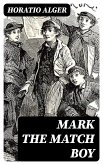In "Eric, or Little by Little," F. W. Farrar weaves a compelling narrative that centers on the life journey of young Eric, who faces the challenges of bullying, personal growth, and moral dilemmas. Set within the context of Victorian England, the novel blends a didactic tone with vivid characterizations and rich descriptions that bring to life the struggles of adolescence. Through Eric's experiences in a boarding school, Farrar not only offers a critique of the educational practices of his time but also explores themes of friendship, integrity, and faith against the backdrop of a society grappling with notions of masculinity and self-worth. F.W. Farrar, a cleric and a leading figure in the literary world of the late 19th century, brings to this work his deep understanding of the adolescent psyche, influenced by his own experiences as a teacher and minister. His commitment to moral and ethical instruction is evident throughout the narrative, reflecting the Victorian emphasis on character building. Farrar's background in classical literature and theology informs his storytelling, imbuing it with layers of meaning and a sense of purpose that transcends mere entertainment. "Eric, or Little by Little" is a timeless exploration of youth, resilience, and moral character that beckons readers of all ages. Farrar's ability to engage with the fraught landscape of growing up makes this novel an essential read for those interested in literature that challenges and inspires. It is a profound reminder of the importance of kindness and the impact of choices made in the tender formative years.
Dieser Download kann aus rechtlichen Gründen nur mit Rechnungsadresse in A, B, BG, CY, CZ, D, DK, EW, E, FIN, F, GR, H, IRL, I, LT, L, LR, M, NL, PL, P, R, S, SLO, SK ausgeliefert werden.
Hinweis: Dieser Artikel kann nur an eine deutsche Lieferadresse ausgeliefert werden.









